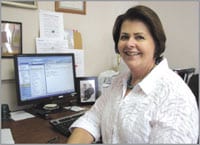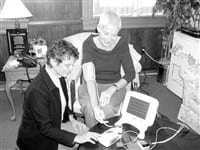Street Smarts Mercy’s Health Care for the Homeless Is Mission Personified
Doreen Fadus was retelling the history of the Health Care for the Homeless (HCH) Program at Mercy Medical Center, something she’s done often in her role as executive director of Community Health for the facility, because doing so provides perspective — and additional inspiration.
It all started in 1983 with Sr. Julie Crane, a member of the Sisters of Providence, she explained, adding that Crane went to then-Mercy President Sr. Mary Caritas with a common-sense proposition — to administer care to Springfield’s growing homeless population in an effort to further the system’s mission and, in the process, help bring down the overall cost of health care in the community — and a request (which was met) for a $10,000 grant with which to get started.
“She started it, quite literally, out of the truck of her car,” recalled Fadus, “administering care and doing outreach in the true sense of that word; she would be at the shelters, but she would also go where the homeless resided, whether it was by down by the railroad tracks, parks, or even bars — and provide services.”
Much has changed over the course of nearly three decades. Health Care for the Homeless is now a national initiative, following the passage in 1987 of the Stewart B. McKinney Homeless Assistance Act. Locally, the budget for the program, one of 200 across the country, features a few more zeroes, and there is a much greater level of administration and participation. Today, an 18-member Mercy Homeless Health Care team provides primary care service on-site at 46 shelters, soup kitchens, job-placement sites, and transitional programs across the region. In a typical year, HCH will care for more than 2,300 people in Hampden, Hampshire, and Franklin counties, and last year, it recorded close to 13,000 ‘encounters,’ or medical visits.
But from the big-picture perspective, nothing has really changed since 1983, Fadus continued, noting that the broad assignment is the same — providing needed services to an often-overlooked constituency — and so are the reasons for carrying it out. First, Health Care for the Homeless, perhaps better than any other single program, personifies the mission of the Sisters of the Providence: to provide outreach and care to underserved populations in the region, she said. But beyond that, it is helping to bring down the cost of health care by reducing the number of visits to already-clogged emergency rooms and treating individuals before health problems become more serious, and costly.
For this issue, HCN talked at length with Fadus about Healthcare for the Homeless and why it truly is mission personified for the health care system started by the Sisters of Providence.
Taking It to the Streets
Fadus told HCN that quantifying and qualifying the general impact of the Health Care for the Homeless is a somewhat challenging assignment (especially the latter), but it is an important part of the equation.
Indeed, at a retreat in June attended by HCH staffers, she opened the proceedings by asking the question, “what would our community be like without Health Care for the Homeless?”
The answers — ranging from longer waits in the emergency room for everyone who visits there, to reduced access to needed care for homeless individuals, to a lower quality of life for that already-challenged segment of the population — explains why the program was initiated all those years ago, and why it has expanded, geographically and in all other ways, over the past three decades.
“A lot of what we do is educational in nature,” she said, “meaning everything from how to take care of yourself medically to understanding the health care system, or accessing the health care bureaucracy as a whole. These are vitally important services.”
Fadus, who worked in homeless services for the city of Springfield before coming to Mercy in 2000, said the projected size of the homeless population in the region varies with which group is doing the counting, but the number is believed to be somewhere between 4,000 and 6,000.
That’s a sizeable constituency, and one with a host of needs and challenges, many of which are intertwined, she said, adding that the task of addressing these issues is a collaborative effort involving HCH, the Springfield Public Health Department, and Open Pantry Community Services Inc. The three groups applied together for one of the first Health Care for the Homeless grants, with the city of Springfield being the lead entity, HCH being the medical arm, and Open Pantry being the social-services organization.
A quarter-century later, the partnership oversees a number of moving parts, or components, within the initiative, including everything from efforts to help clients secure health insurance (now mandated by the state) to providing a coordinated approach to addressing the many issues that lead to homelessness, such as mental-health conditions or substance-abuse issues, to matters of education and prevention.
The main service area is the New Resource Center at the Worthington Street Shelter in Springfield, where HCH has a clinic, but there are 25 sites in all across Western Mass., including facilities in other, larger communities, like Northampton and Greenfield, and also a host of smaller sites serving perhaps a few dozen people.
The 13,000 encounters mentioned earlier come in three categories, said Fadus: medical, case management, and mental health, with 75{06cf2b9696b159f874511d23dbc893eb1ac83014175ed30550cfff22781411e5} of these being the medical realm.
“People come to us for a variety of reasons,” she explained. “There’s urgent care, chronic-disease management, rashes, gastric issues, repiratory matters — the usual things that people go to doctors for,” for explained. “The program is to set up to fill the gap in between the person and access to primary care; our job is truly to help people access mainstream services, and not replace them.
“Although we can have primary-care patients now,” she continued, “our goal is to move homeless individuals into the health centers, to physicians’ offices, and the clinics in the city.”
And one of the keys to doing so is assisting individuals with the task of securing insurance. “We’ve very assertive about getting people on health insurance, especially since health care reform kicked in several years ago,” she said. “We assist them with getting health insurance, with getting birth certificates, with IDs so they can fill out the paperwork … it’s a very cumbersome process, and there are still some people who fall through the cracks.”
Describing a typical case, Fadus said it is most often a walk-in visit, although appointments can be made. After what is usually a short wait, the patient will see a case manager to make sure the individual has insurance and paperwork is up to date. An RN will then do triage, and the patient will then meet with a medical doctor, who will provide services.
“It’s very much like any other clinic would be — with the same high standards for quality and care,” she explained, adding that HCH, because of the constituency it serves, must become what she called a “mini-accountable care organization,” meaning that it must look well beyond purely health care questions and issues and to matters such as whether the individual has a $2 co-pay and whether he or she has transportation to the office of a specialist.
“Our staff has gone with people when they’ve needed a procedure,” she explained. “It goes well beyond saying simply, ‘this is what you need to do.’ We’re involved in every aspect of making sure that that next step is accomplished.
“When someone comes in when we’re doing foot care, we’ll give them socks, we’ll send them home with things to take care of their feet better,” she continued. “We have clothes on hand … we focus on things that would complete the appointment that aren’t available in traditional medicine.”
And just as Sr. Crane did back in 1983, HCH staff members still undertake considerable outreach efforts.
“We still go to where the homeless reside, whether it’s abandoned buildings, the riverbanks, or parks,” she explained, adding that they’re engaging these individuals and essentially trying to get them off the streets.
At Home with the Idea
Fadus said work with the homeless is the specific assignment for the HCH staff. But in many ways it is a Mercy-wide and system-wide undertaking.
Indeed, she said the Pharmacy staff at Mercy recently volunteered as a group to serve meals at the soup kitchen on Worthington Street, and many other departments have taken their turns as well.
That’s one of the many changes that have taken place since Sr. Crane administered care out of her station wagon, said Fadus, adding, again, that the work, its purpose, and its many benefits have remained constants.
Now, as then, HCH has been mission personified.



Comments are closed.